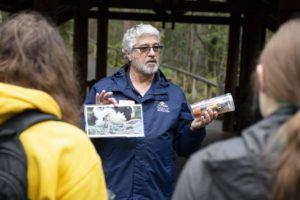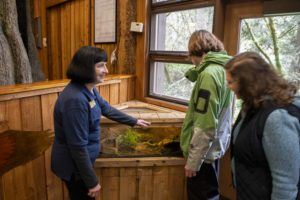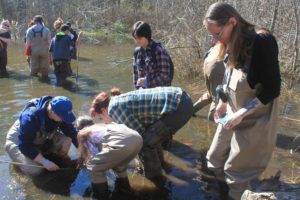It’s not for the faint of heart. You have to talk to strangers, spend hours outside or even wade through cold ponds. But volunteering at Northwest Trek is infinitely rewarding – for yourself and for the planet.
Richard

Richard Nichols is standing beside a cart on the Bear Bridge. He’s been a volunteer at Northwest Trek for a year, and he knows exactly what to say when a family wanders along, the father looking around uncertainly.
“Tram?” says Nichols, succinctly. The father nods. Nichols points down to the Discovery Tram Tour station. “That way, sir. Keep going and you’ll find it.”
The family smiles gratefully and moves on. But behind them is a school group of teenagers, who turn onto the bridge with their chaperone, who asks where the bears are.
Nichols, cart ready, seizes the opportunity. “Just down there are the black bears,” he says. “And they’re marvelous critters. But do you mind if I take up a minute of your time?”
The group pauses, and Nichols picks up a plush toy otter from the cart. It has a plastic six-ring hanging around its neck.
“So, does anyone know what we’ve got here?” he begins. Then he holds up a jar filled with plastic detritus: cigarette lighters, lids, a toothbrush stub. “And see all this stuff? All this came out of the stomach of a baby albatross.”
As he speaks, the teenagers morph from wary to wide-eyed. With disarming openness and the no-nonsense phrases of the 71-year-old military veteran that he is, Nichols holds his audience captivated. He gets right to the point of how plastic trash is devastating rivers and the ocean, harming the creatures that live there – like river otters, two of whom are splashing just nearby in the Wetlands habitat area.
Soon the teens are asking questions, passing the cart’s educational materials around and paying close attention. Nichols finishes up, still speaking in the same deep, calm tone.
“So it’s up to us. Next time you go to a café, say you don’t need a straw. Or bring your own cup. Use a reusable bag at the store. It’s simple stuff. Now, I’ll let you go. Thanks for listening.”
Clearly thinking hard, the teens move off.
Nichols is an education volunteer at Northwest Trek, and for him it’s far deeper than just a feel-good job.
“This is a sanctuary,” says the veteran and retired architect, who also volunteers at Wolf Haven. “A lot of the critters here, they’ve been orphaned or rescued in the wild. This is their forever home. Volunteering at Northwest Trek gives me the opportunity to be around all kinds of critters and help them. This is my favorite place.”
As an education volunteer, Nichols is often out with the cart, talking to guests about animals and conservation – and he likes it.
“Nature is a lot about education,” he says. “We don’t often talk about the environment and how interconnected everything is. That’s what I hope to get across.”
Judith

Over at the Cheney Discovery Center, Judith Hansen is cleaning the glass front of the corn snake habitat. The cabin’s empty.
Suddenly, the door opens and a flood of guests come in: a woman and her nephew from the U.K., four residents of an adult group home with their younger chaperone. In an instant Hansen’s tucked the spray bottle away and is opening the door, welcoming everyone, demonstrating that the life-size replica bear is definitely touchable and explaining how often the snake is fed.
Weaving deftly around both guests and conversations, Hansen exudes friendliness and a passion for nature. As she talks about the Western toad, the British boy asks how long toads live in the wild.
“Oh – I don’t know that, let me go and look it up!” says Hansen, picking up a reference book.
A volunteer at Northwest Trek since 1998, Hansen has helped out in almost all areas of the wildlife park. Retired from and now volunteering with the Civil Air Patrol, she loves working with young people and is passionate about the outdoors.
“I’ve always liked being outside,” she explains. “I love the mountains, the foothills, the forest. And I love learning – I’m always trying to learn.”
But for Hansen, like Nichols, volunteering at Northwest Trek goes deeper than just learning about nature.
“I get to do things I wouldn’t otherwise do, and sharing that, especially with young people,” she says. “To me it feels like an honor to volunteer here.”
Kim

On a sunny April morning, Kim Bryant is wading hip deep through a chilly pond. Bending over, she examines a jelly-like lump on a strand of reeds, then straightens up.
“I’ve found another one!” she cries.
Bryant’s part of a group of conservation volunteers at Northwest Trek’s wetland mitigation site just north of the wildlife park, and she’s learning to identify amphibian eggs. Part of a program every spring that trains volunteers at Trek before sending them out to their local communities to find frog, toad, newt and salamander egg masses, the egg mass count is community science at its best, giving valuable data on native species to scientists and helping them understand and protect wildlife.
“I’ve done wetland restoration before, and it’s so beautiful here,” explains Bryant, a marine ecology student, as she moon-walks through the water, scanning just below the surface.
Nearby, Rachael Mueller combines volunteer training with a bubbly, contagious passion for nature and science. Armed with waterproof notepads, a GPS and waders, her volunteers will be thoroughly trained in identifying eight species of stillwater-breeding amphibians in both a classroom and outdoor session. As formal volunteers, they’ll also have the option of signing up for other Trek community science events, like bat counts and adult frog monitoring.
“See how the eggs are all packed into that one there?” Mueller says. “That’s a Pacific tree frog mass. As they develop they become lighter, while the long-toed salamanders get darker. They only just started breeding out here.”
“So cool,” adds Bryant, gently fingering the sloppy, Jello-like mass in the water.
As another volunteer points out a hopping tree frog, everyone coos in admiration for the tiny amphibian.
But conservation volunteering isn’t just about splashing around finding frogs. It’s about helping the planet, one egg at a time.
“This is important for local wildlife,” explains Bryant. “Not so many people are doing this, so it’s good to help out.”
DO IT: Northwest Trek encourages volunteers for education, conservation, special events and horticulture. All formal volunteers must go through application, orientation and training. The next orientation dates are June 8 and August 21, while the next training dates are June 8 and August 28. Sign up here.
LEARN MORE: On our Volunteers page.